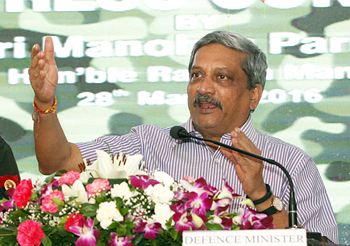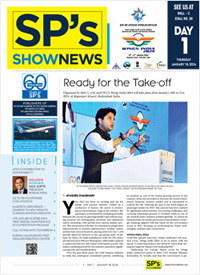- Prime Minister Narendra Modi inaugurates Aero India 2023 in Bengaluru; Releases Commemorative Stamp
- Defence Secretary meets delegations from Saudi Arabia, USA and Oman on the sidelines of Aero India 2023
- Foreign Ministers of 32 countries to attend Aero India 2023
- Embraer showcases the C-390 Millennium at Aero India 2023
We Don’t Need Money, We Need Systems in Place: Defence Minister

The Minister of Defence Manohar Parrikar today emphatically stated that money (budgetary allocation) is not an issue, the issue is of putting proper systems in place and that his government was doing all that it could do to have them in place.
Speaking at the Global Investors’ Summit ‘Make in India for Defence Sector’, jointly organised by the Investment & Technology Promotion Division of Ministry of External Affairs and ASSOCHAM, the Minister said: “We have a syndrome of plenty. I do not need more money and there is a wrong perception prevailing that we do not have funds for acquisition. I need to get the systems in place. In fact, we are giving back the money that is being allocated.”
Explaining the situation, he said that 85 per cent of the money released was for equipment that were contracted about five years back. This ‘committed liability’ is what is getting paid now. The orders placed last year or this year, the Ministry paid about 15 per cent of the orders. “You have to realise when the money is required.”
It is in this background that the government was working on creating an ecosystem. “We have tried many modifications to production and procurement. We have attempted a good draft in the Defence Procurement Policy 2016 and we welcome suggestions and recommendations from the industry. We will filter out undesirable inputs and we give it next two to three months for it to have an impact. The policy will be reviewed after six months.”
Parrikar stated that when he took over as the Defence Minister, he was surprised to notice that AONs (acceptance of necessity) was to the tune of 5,09,000 crore and at least eight of the projects were pending for the past 10 years. “There were at least 77 AONs which were five years old.” The government is working on AONs and it will weed out all technologies which are out of date.
DPSUs/OFB necessary
Defending the continued existence of some projects under defence public sector undertakings (DPSUs), the Minister said: “We are maintaining a huge armed forces, not with the expectation of war. War is the last option. We require 3,41,000 crore for maintenance of armed forces. Eventuality requires us to do it. Similarly, we need to create capabilities which may not be required continuously. It cannot be built by the private sector because of costs and the short lived nature of the projects.” He referred to how a particular tank project could be continued only with the help of a DPSU. “Private sector would have closed the project and moved on.” The Minister said that retaining the DPSUs and the OFBs is a necessity of the defence forces.
The government, he said, can sustain capacities for future requirement while there is certainly need for the private sector. The private sector, particularly the smaller companies, do not go for L1 requirement. “It is not that the private sector is flexible, the big ones do go through tendering. It is only the MSMEs which are adaptable.”
Stressed Diabetes
Defence procurement process, he said, is cumbersome and it gave ‘stressed diabetes’ to those in this business. Agreeing that the procedures followed were too difficult, he said, the bureaucracy had issues of taking decisions. The need to say ‘the buck stops here’ in the bureaucracy is essential and probably this was lacking during the earlier regime, he said and mentioned how he cleared files after going through them and took responsibility of the same.
The Summit had addresses by Major General Bishamber Dayal (Retd), Chairman, ASSOCHAM National Council on Defence and Aerospace; Sunil Kanoria, President ASSOCHAM and industry address by Anil Dhirubhai Ambani, Chairman and CEO, Reliance ADA Group; Bimal Sareen, Director, OIS-AT and Pierre De Bausset, President and Managing Director, Airbus Group.





